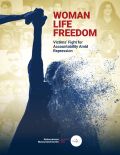Woman, Life, Freedom: Victims' Fight for Accountability Amid Repression

“Where in the law does it say that the mother of a victim should be imprisoned for seeking justice for her child while the murderer walks freely in the streets? It seems that the roles of plaintiff and defendant are reversed. My mother is a grieving person seeking justice. My mother does not deserve prison.”
Since 2017, the Islamic Republic of Iran has faced repeated waves of protests, each met with brutal repression and systemic impunity. The November 2019 fuel price protests, the deadliest in decades, were met with lethal force, with authorities consistently obscuring the truth, blaming "rioters" and "external enemies," and intimidating victims' families into silence. However, the 2022 "Woman, Life, Freedom" protests, sparked by Mahsa Jina Amini’s death in Morality Police custody, marked a turning point. This unprecedented uprising, involving women and children and spreading nationwide, sparked global solidarity and new efforts to hold Iran's leaders accountable.
The government’s response to the 2022 protests was characterized by extreme brutality. Thousands were unlawfully killed, blinded, or injured, with Kurdish and Baluch minorities disproportionately targeted. Tens of thousands, including children, lawyers, and journalists, were detained and subjected to torture, rape, humiliation, and imprisonment. At least seven were executed.
This violence, widely disseminated through videos online, fueled international outrage, culminating in the creation of the United Nations Independent Fact-Finding Mission on the Islamic Republic of Iran (FFMI). Tasked with investigating Mahsa Amini's death and the state’s violent crackdown, the FFMI aimed to uncover the truth about the systemic impunity and lack of justice for victims.
Iranian authorities, facing global scrutiny, conducted their own investigations, which failed to meet international standards. Official narratives frequently deflected blame onto "terrorists" or "rioters," while evidence pointing to state violence was systematically suppressed. For example, President Raisi's Special Committee exonerated the Morality Police and security forces in Amini’s death, denying access to crucial evidence and downplaying security forces' involvement in killings.
In contrast, the FFMI's March 2024 findings highlighted state-sponsored violence, including unlawful killings, systemic torture, and sexual violence – acts amounting to "crimes against humanity." It revealed that Iranian investigations were neither impartial nor thorough, offering no transparency or accountability to victims' families.
Among the 16 cases investigated by Abdorrahman Boroumand Center for Human Rights, only two resulted in prosecution of state agents and their conviction. Even those lacked transparency and independent scrutiny. Families pursuing justice faced threats, harassment, and legal persecution, while their lawyers risked imprisonment or professional bans. The judiciary often failed to hold perpetrators accountable, offering financial compensation to silence families instead.
Two years after the "Woman, Life, Freedom" protests, justice remains a distant goal. Survivors and victims' families have lost faith in the judiciary, which they view as both ineffective and dangerous. Iran’s deeply flawed legal framework perpetuates impunity, leaving protests as the only avenue for change despite the inevitable risk of more bloodshed.
The FFMI’s work highlights the urgent need for international vigilance and pressure on Iran. Its recommendations include applying universal jurisdiction for crimes against humanity, prioritizing asylum for victims, and funding psychological support progra It also emphasizes the need for structural reforms in Iran’s judiciary to ensure accountability and uphold human rights.
The international community must sustain pressure on Iran, demanding justice, structural reforms, and political participation. Partnering with the FFMI is crucial to achieving justice and reparations for victims outside Iran. To break the cycle of violence, the world must unequivocally signal that impunity for repressing protesters will no longer be tolerated.
Read the full report in PDF format.